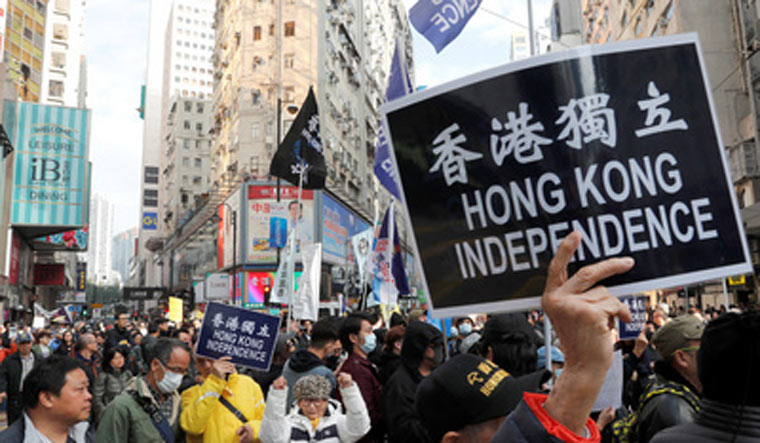In the past one year, countries like Britain and United States have expressed their concern of numerous incidents according to them that have undermined confidence in Hong Kong's freedoms and autonomy under Chinese rule. Today thousands of demonstrators marched in favour of full democracy, fundamental rights, and even independence from China in the face of what many see as a marked clampdown by the Communist Party on local freedoms.
Incidents that affect freedoms in Hong Kong include arresting of activists, a ban on a pro-independence political party, the de facto expulsion of a Western journalist and barring democracy activists from contesting local elections. The former British colony returned to Chinese rule in 1997 under a "one country, two systems" formula, with the promise of a high degree of autonomy and universal suffrage as an "ultimate aim". The city is touted to have one of the most robust judicial systems. But recent accusations of politicizations of certain legal cases, has caused this reputation to come under a cloud.
The march saw 5,800 people coming out, with calls to restart stalled democratic reforms and to fight "political repression" from Beijing."Looking back at the year that passed, it was a very bad year ... The rule of law in Hong Kong is falling backwards," said Jimmy Sham, one of the organisers. Some of the protestors denounced a move by China for constructing a high speed railway station in Hong Kong, which would be considered as the mainland and be governed by mainland laws.
100 independent activists joined the march, despite authorities clamping down hard on the city's fringe, pro-independence movement. China considers Hong Kong to be an inalienable part of its territory, and denounces "separatists" as a threat to national sovereignty. In the past, movements like this have not gained much momentum. Joshua Wong, one of the democracy activists jailed last year, said, “We have encountered many difficulties last year, including some of us being sued and jailed, but we will stand with Hong Kong people,” Mr. Wong said. “We will fight for the rule of law, fight for Hong Kong, fight for the future, fight for the next generations.”
China's reach of security apparatus was another main worry according to some protestors. Despite their show of defiance, they fear that Hong Kong would continue to be squeezed by Beijing.
Hong Kong authorities banned a political group, the Hong Kong National Party, for its pro- independence stance on national security grounds. A western journalist, Victor Mallet, was also effectively expelled from Hong Kong, soon after he hosted a talk at a press club by the head of the National Party. Some protesters also carried "wanted" posters of Hong Kong's top legal official, Theresa Cheng, criticising a decision to drop a corruption investigation into Hong Kong's former pro-Beijing leader Leung Chun-ying, without a satisfactory explanation.
Joseph Cheng, a veteran rights campaigner said "We're going to face a few difficult years, but we must stand firm ... Unlike in mainland China, at least we can still protest."


